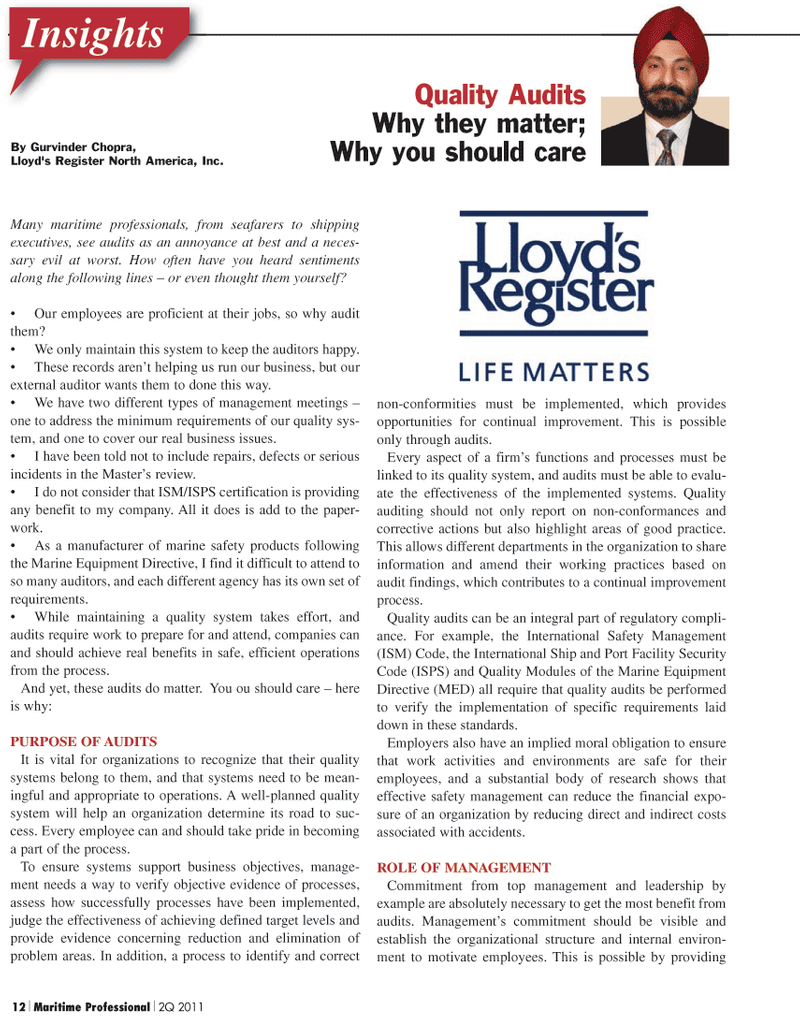
Page 12: of Maritime Logistics Professional Magazine (Q2 2011)
Energy Transportation
Read this page in Pdf, Flash or Html5 edition of Q2 2011 Maritime Logistics Professional Magazine
12 Maritime Professional 2Q 2011
Many maritime professionals, from seafarers to shipping executives, see audits as an annoyance at best and a neces- sary evil at worst. How often have you heard sentiments along the following lines – or even thought them yourself? • Our employees are proficient at their jobs, so why audit them? • We only maintain this system to keep the auditors happy. • These records aren’t helping us run our business, but our external auditor wants them to done this way. • We have two different types of management meetings – one to address the minimum requirements of our quality sys- tem, and one to cover our real business issues. • I have been told not to include repairs, defects or serious incidents in the Master’s review. • I do not consider that ISM/ISPS certification is providing any benefit to my company. All it does is add to the paper- work. • As a manufacturer of marine safety products following the Marine Equipment Directive, I find it difficult to attend to so many auditors, and each different agency has its own set of requirements. • While maintaining a quality system takes effort, and audits require work to prepare for and attend, companies can and should achieve real benefits in safe, efficient operations from the process.
And yet, these audits do matter. You ou should care – here is why:
PURPOSE OF AUDITS
It is vital for organizations to recognize that their quality systems belong to them, and that systems need to be mean- ingful and appropriate to operations. A well-planned quality system will help an organization determine its road to suc- cess. Every employee can and should take pride in becoming a part of the process.
To ensure systems support business objectives, manage- ment needs a way to verify objective evidence of processes, assess how successfully processes have been implemented, judge the effectiveness of achieving defined target levels and provide evidence concerning reduction and elimination of problem areas. In addition, a process to identify and correct non-conformities must be implemented, which provides opportunities for continual improvement. This is possible only through audits.
Every aspect of a firm’s functions and processes must be linked to its quality system, and audits must be able to evalu- ate the effectiveness of the implemented systems. Quality auditing should not only report on non-conformances and corrective actions but also highlight areas of good practice.
This allows different departments in the organization to share information and amend their working practices based on audit findings, which contributes to a continual improvement process.
Quality audits can be an integral part of regulatory compli- ance. For example, the International Safety Management (ISM) Code, the International Ship and Port Facility Security
Code (ISPS) and Quality Modules of the Marine Equipment
Directive (MED) all require that quality audits be performed to verify the implementation of specific requirements laid down in these standards.
Employers also have an implied moral obligation to ensure that work activities and environments are safe for their employees, and a substantial body of research shows that effective safety management can reduce the financial expo- sure of an organization by reducing direct and indirect costs associated with accidents.
ROLE OF MANAGEMENT
Commitment from top management and leadership by example are absolutely necessary to get the most benefit from audits. Management’s commitment should be visible and establish the organizational structure and internal environ- ment to motivate employees. This is possible by providing
Quality Audits
Why they matter;
Why you should care
By Gurvinder Chopra,
Lloyd's Register North America, Inc.
Insights

 11
11

 13
13
